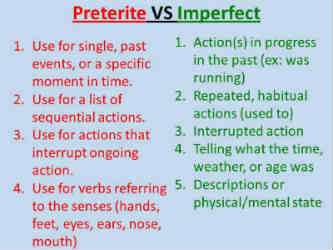Preterite vs. Imperfect
Preterite vs. Imperfect Lesson
Preterite vs. Imperfect Quizzes
The preterit and imperfect are simple tenses of the indicative that refer to a past action or state. Sometimes they may have the same English translation, but they have different meanings or implications, as in the following example:
Ayer estuve feliz.
Yesterday I was happy. (today I am not)
Ayer estaba feliz.
Yesterday I was happy. (today I may or may not be: I’m not saying)
De pequeño fui a Nueva York.
As a boy I went to New York. (once, presumably)
De pequeño iba a Nueva York.
As a boy I went to New York. (habitually, presumably)
A habitual action in the past (normally expressed in English with “used to” or “would”):
Siempre íbamos a la iglesia los domingos.
We always used to go to church on Sundays.
Compraba dulces en la tienda de mis vecinos.
I would buy sweets at my neighbor’s store.
A series of actions that took place simultaneously:
Los niñas cantaban, los niños jugaban, y los perros ladraban.
The girls were singing, the boys were playing, and the dogs were barking.
A past action or state in progress. In English we often use the past progressive (“was/were ...-ing”) to convey this nuance:
Caminábamos tranquilamente.
We were walking in peace.
Mientras ellos miraban...
While they were looking on.
Descriptions in the past (because they are, in a way, a past action or state in progress):
En 1998 yo era joven y bonito.
In 1998 I was young and beautiful.
De pequeña tenía el pelo liso.
As a girl I had straight hair.
Information about the time of day, the date, age:
Eran las 10 de la mañana.
It was 10am.
Era el 3 de julio de 1990.
It was July 3, 1990.
La chica tenía 12 años.
The girl was 12 years old.
Expressions about the weather when they are background information, not when they indicate a change or the start/end of a state, in which case the preterit is used:
Hacía frío y llovía.
It was cold and it rained.
Anteayer llovió todo el día.
The day before yesterday it rained all day long.
A las 5 hizo mucho viento.
At 5 it was very windy.
Mental states (in progress) in past time.
Carlos no sabía nada.
Carlos didn't know anything.
Creíamos que te habías ido.
We thought you had gone.
A past action or state presented as completed and done and over with. This action or state may span long periods of time or may be instantaneous.
El accidente ocurrió a las 8.
The accident took place at 8.
Ayer vi un partido en la tele.
Yesterday I watched a game on TV.
Miriam no dormí en toda la noche.
Miriam didn’t sleep the whole night.
Los incas vivieron en el Perú durante 8 siglos.
The Incas lived in Peru for 8 centuries.
A series of sequential actions in the past:
Vine, comí, dormí.
I came, I ate, I slept.
Fui a la tienda, compré leche y regresé a casa.
I went to the store, I bought milk and I went back home.
The beginning or the ending of an action or a state, or any change in a past state:
Me enfadé muchísimo.
I got very angry.
Dejó de nevar.
It stopped snowing.
El tiempo mejoró.
The weather improved.
Juan Perón se sintió peor a causa de su enfermedad.
Juan Perón felt worse because of his illness.
An action that interrupts a previously existing action or stated (normally expressed in the imperfect).
Mientras los guardaespaldas miraban, el asesino mató al rey de España.
While the bodyguards were looking on, the assassin killed the king of Spain.
Verbs that seem to “change meaning” in the preterit (with respect to the infinitive and the imperfect).
There is no change in meaning but, rather, a change in the way we translate the different nuances in English. These are the most common such verbs:
conocer: to know
imperfect -> knew, used to know
preterit -> met, made the acquaintance (of someone)
Los conocía en Tailandia.
I knew (used to know) them in Thailand.
Los conocí en Tailandia.
I met them in Thailand.
haber: there to be
Había mucha gente en la escuela.
There were many people at the school.
Hubo un accidente.
An accident occurred (happened).
poder: to be able to, can
¿Podías trabajar con tanto ruido?
Were you able to work with so much noise?
¿Pudiste trabajar con tanto ruido?
Did you manage to work with so much noise?
querer: to want, to love
De pequeña quería ser doctora.
As a little girl I wanted to be a doctor.
Más tarde quise ser ladrona.
Later on I wanted to be an thief.
no querer: not to want
Yo no quería ir.
I didn’t want to go. (I may or may not have gone)
Yo no quise ir.
I refused to go. (I didn’t go)

Popular Phrase: usos de los adjetivos | Rosetta Stone for Spanish | Conjugated Verb: desaferrar - to weigh anchor [ click for full conjugation ]
